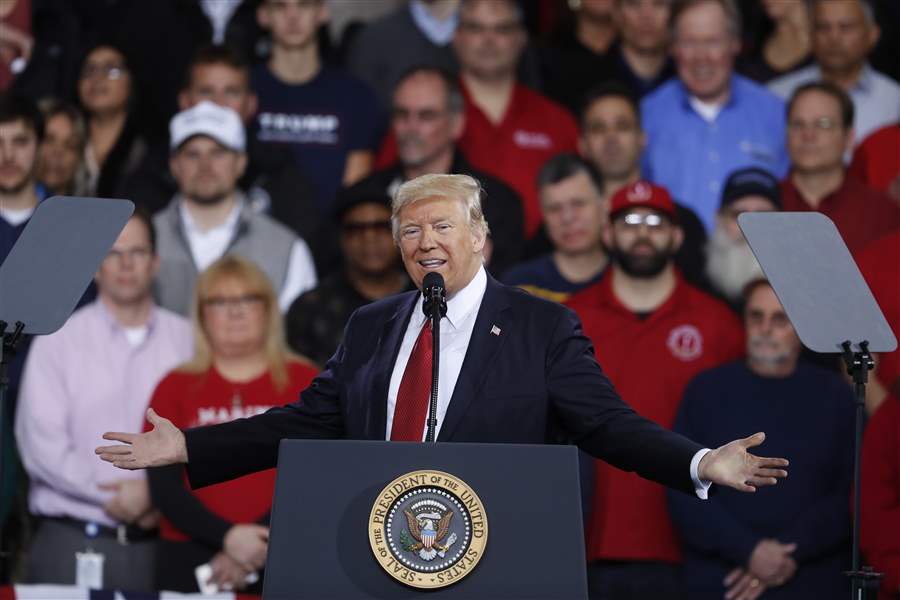
Trump cancels Obama order on fuel economy
President vows review of standards for vehicles
3/15/2017
President Trump speaks at the American Center for Mobility on Wednesday in Ypsilanti Township, Mich.
ASSOCIATED PRESS
YPSILANTI, Mich. — President Trump said today that his administration will revisit EPA rules governing future fuel economy standards as he attempts to peel back many of the regulations set by his predecessor.
The president made the announcement at an event at the American Center for Mobility, a up-and-coming testing facility for self-driving and connected cars in Ypsilanti, Mich.
The Corporate Average Fuel Economy standards were put in place by the U.S. Environmental Protection Agency in 2012, setting guidelines out to 2025. The president effectively is directing the EPA to reopen the midterm review that was initially set to be completed in 2018, but was rushed through in the last days of the Obama Administration.
“Today I am announcing we are going to cancel that executive action," President Trump said. "We are going to restore the originally scheduled midterm review and we are going to ensure any regulations we have protect and defend your jobs, your factories. We’re going to be fair."
Several top U.S. auto executives were in the crowd, as were hundreds of union autoworkers who had been bused in from plants in Ohio and Michigan. That included about 60 employees of the Fiat Chrysler Automobiles’ Toledo Assembly Complex.
The effect of President Trump’s proposal to redo the review of fuel economy targets isn’t entirely clear, though it could possibly step back the fuel economy targets to levels more in line with what automakers would like to see.
Current EPA requirements, put in place in 2012 and reaffirmed just days before President Obama left office, mandate that automakers must have an average fleet economy of 54.5 miles per gallon by the 2025.
The figure is certainly lofty. But it’s also somewhat misleading, as the real world fuel economy target will be closer to 40 miles per gallon. And not every vehicle will be required to meet even that — pickup trucks, for example, will have lower targets than will small cars.
Even so, executives from a number of top automakers have expressed concern about the feasibility of hitting that target, particularly now as Americans are increasingly shunning cars for larger crossovers, sport utility vehicles, and trucks.
Sergio Marchionne, the chief executive officer of Fiat Chrysler, said the expedited process from the Obama Administration to try to lock in the rules ahead of of Trump taking office wasn't what was supposed to happen.
"Somebody actually shortcut the system itself. That was not the intent when the 2025 rules were put in place," Mr. Marchionne said. "I was there. We all agreed that 2017 and 2018 were going to be used to carry out a through midterm review with the full participation of the auto industry."
Whatever the end result is, Mr. Marchionne said he'll feel better knowing the industry was involved in the review as originally intended.
Research from Michael Sivak, director of the Sustainable Worldwide Transportation Research Institute at the University of Michigan, found the average EPA-rated fuel economy of new vehicles sold in the United States last month was 25.1 miles per gallon.
Mr. Sivak noted that’s 5 mpg higher than what the study reported in October, 2007 — the first month for the ongoing project — but down 0.4 mpg from the peak reached in August 2014.
In a Feb. 21 letter sent to EPA director Scott Pruitt, the Auto Alliance, an industry association representing a dozen automakers, including General Motors, Ford Motor, and Fiat Chrysler, asked for the Trump Administration to reexamine those fuel economy standards, in part because it said the EPA hasn’t fulfilled its duty for a real
In the letter, the group said the "standards threaten to depress an industry that can ill afford spiraling regulatory costs. If left unchanged, those standards could cause up to 1.1 million Americans to lose jobs due to lost vehicle sales.”
Other studies have called those figures into question.
Environmental groups responded quickly to the president’s action. In a statement, Rhea Suh, president of the Natural Resources Defense Council said the change made no sense.
“Mileage standards save consumers money at the gas pump, make Americans less dependent on oil, reduce carbon pollution and advance innovation,” she said. “The current standards helped the auto companies move from bankruptcy to profitability, and there is no reason they cannot be met. This is just another part of President Trump’s retreat from action on climate change."
Though the news of the day was the decision on re-opening the midterm review of CAFE standards, President Trump spent much of the speech rehashing campaign promises to rebuild U.S. manufacturing.
“I am going to fight for your jobs and fight very very hard," he said. "I’m going to fight for Michigan workers. I’m going to fight to keep the automobile production in the United States of America, in, not outside, in the United States.”
Contact Tyrel Linkhorn at tlinkhorn@theblade.com or 419-724-6134.